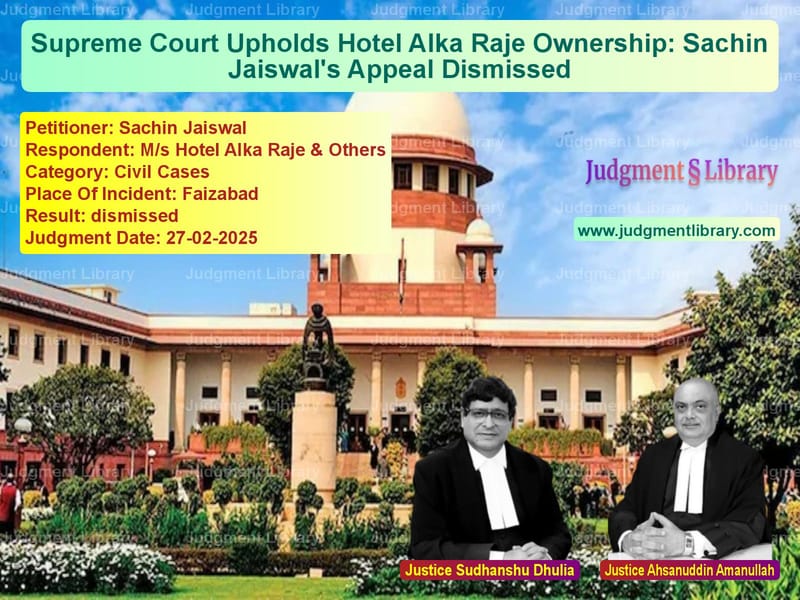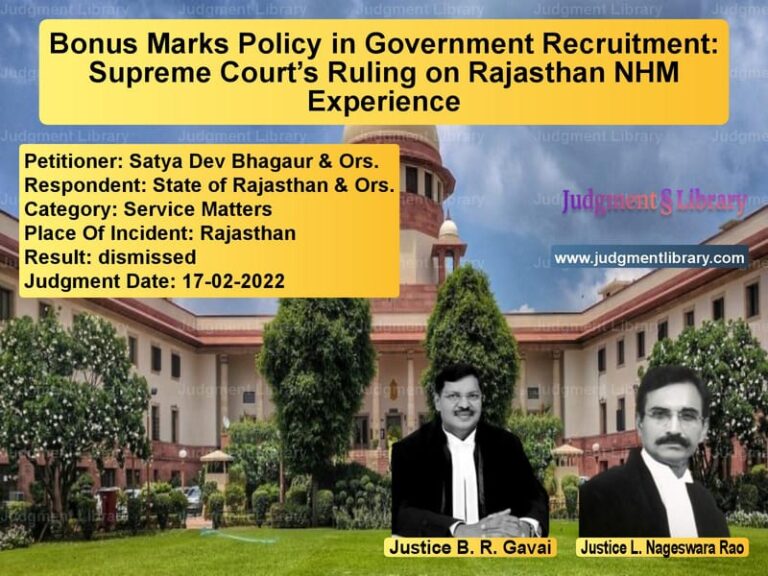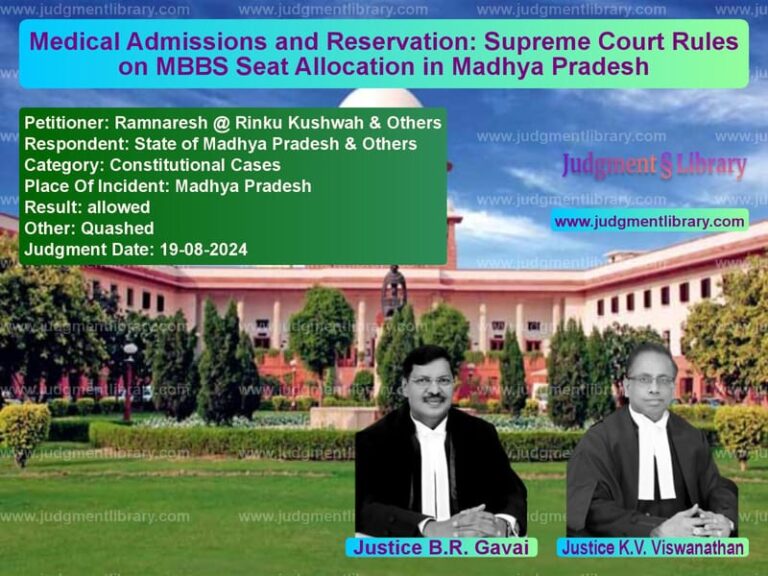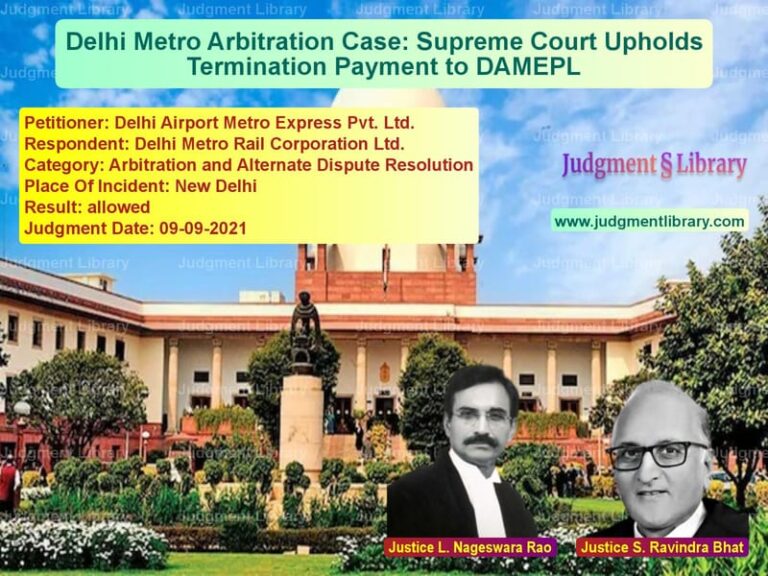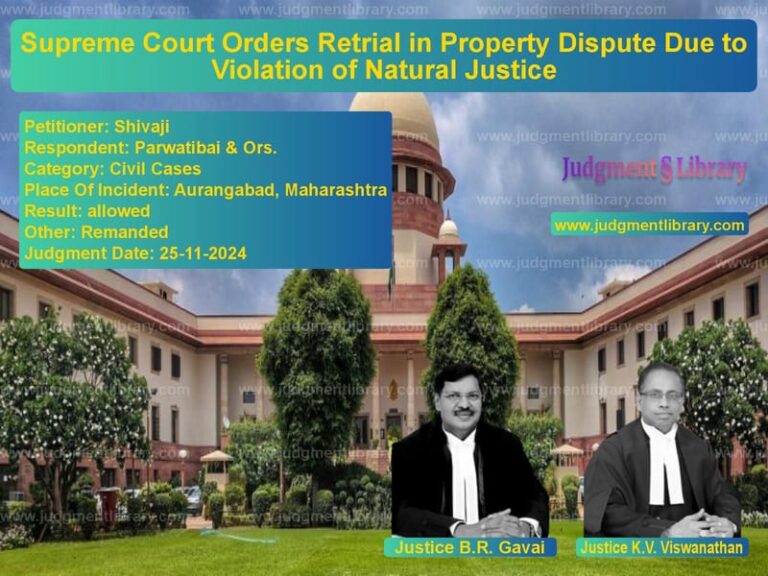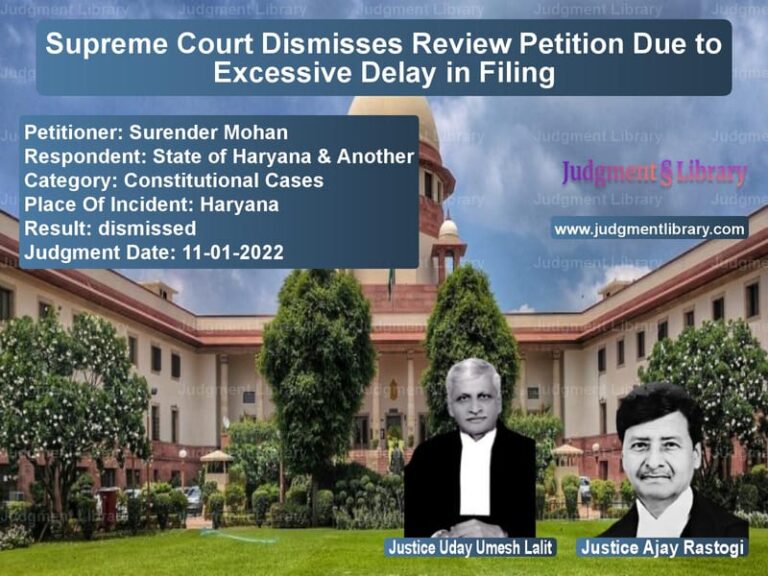Supreme Court Upholds Hotel Alka Raje Ownership: Sachin Jaiswal’s Appeal Dismissed
The Supreme Court of India, in a significant ruling on February 27, 2025, upheld the ownership of the disputed property by M/s Hotel Alka Raje, dismissing the appeal filed by Sachin Jaiswal. The judgment reinforced the legal position that property contributed to a partnership firm becomes the firm’s property and is governed by the Indian Partnership Act, 1932.
Background of the Case
The case pertains to a long-standing dispute over ownership rights in a hotel business. Late Bhairo Prasad Jaiswal had initially purchased land in 1965, which later became part of a partnership firm named M/s Hotel Alka Raje. Over the years, multiple partnership deeds were executed, bringing in new partners and defining profit-sharing structures.
In 1983, Bhairo Prasad Jaiswal executed a registered relinquishment deed, explicitly stating that neither he nor his legal heirs would have any right, title, or interest in the property. Despite this, his legal heir, Sachin Jaiswal, later attempted to claim ownership rights over the property, leading to legal proceedings.
Petitioner’s Arguments
The counsel for the appellant, Sachin Jaiswal, argued:
“The High Court has erred in its judgment. Ownership rights cannot be transferred through a relinquishment deed; they must be transferred through modes defined in the Transfer of Property Act, such as sale, mortgage, exchange, or gift.”
The appellant contended that:
- The relinquishment deed was not a legally valid mode of property transfer.
- Since the land was originally acquired by his father, he had a rightful claim over it.
- The trial court and High Court failed to recognize that his legal heirs should have inherited a share in the firm.
Respondent’s Arguments
The respondents, representing M/s Hotel Alka Raje, countered the appellant’s claims, arguing:
“The relinquishment deed was duly registered and legally binding. The property was contributed to the firm, making it the firm’s perpetual property.”
Their arguments were based on:
- Section 14 of the Indian Partnership Act, 1932, which states that any property contributed to a partnership becomes its asset.
- The fact that the hotel business continued for decades under the firm’s name without any disputes.
- The partnership deeds clearly outlined the profit-sharing ratios, confirming that Bhairo Prasad Jaiswal had relinquished his claims.
Supreme Court’s Observations
The Supreme Court, after reviewing the evidence and legal precedents, upheld the High Court’s ruling:
“The dispute before the trial court was not about the proportionate share of partners but whether the property of Hotel Alka Raje belonged to the firm. The land was contributed to the partnership and thus became its property.”
Read also: https://judgmentlibrary.com/supreme-court-upholds-impleadment-of-legal-heir-in-property-dispute/
The Court referred to Section 14 of the Partnership Act, stating:
“Any property brought into the partnership stock becomes the firm’s asset. The firm alone holds ownership rights, and partners cannot claim individual ownership.”
Further citing legal precedents, the Court held that:
- Once property is contributed to a partnership, it ceases to be an individual asset.
- The partnership deed executed in 1972 confirmed that the property was intended for business purposes.
- The relinquishment deed, being a registered document, was valid and binding.
Supreme Court’s Final Judgment
The Supreme Court ruled:
“There is no scope for our interference with the High Court’s order. The appeal stands dismissed.”
It reaffirmed that the firm, M/s Hotel Alka Raje, is the sole owner of the property and that the appellant has no claim over it.
Impact of the Judgment
This ruling sets a crucial precedent in partnership law and property rights in business. It clarifies that once a property is contributed to a partnership, it becomes the firm’s property, and legal heirs cannot claim ownership unless expressly stated in the partnership deed.
By dismissing the appeal, the Supreme Court upheld the principle that businesses structured as partnerships must abide by contractual and statutory obligations.
Conclusion
The Supreme Court’s ruling in this case reinforces the importance of legal documentation and adherence to partnership laws. It highlights the significance of registered deeds and confirms that partnership property cannot be claimed by individual heirs outside the firm’s legal structure. The dismissal of the appeal brings finality to a long-standing dispute, ensuring stability in business ownership and legal certainty.
Petitioner Name: Sachin Jaiswal.Respondent Name: M/s Hotel Alka Raje & Others.Judgment By: Justice Sudhanshu Dhulia, Justice Ahsanuddin Amanullah.Place Of Incident: Faizabad.Judgment Date: 27-02-2025.
Don’t miss out on the full details! Download the complete judgment in PDF format below and gain valuable insights instantly!
Download Judgment: sachin-jaiswal-vs-ms-hotel-alka-raje-supreme-court-of-india-judgment-dated-27-02-2025.pdf
Directly Download Judgment: Directly download this Judgment
See all petitions in Contract Disputes
See all petitions in Property Disputes
See all petitions in Specific Performance
See all petitions in Landlord-Tenant Disputes
See all petitions in Judgment by Sudhanshu Dhulia
See all petitions in Judgment by Ahsanuddin Amanullah
See all petitions in dismissed
See all petitions in supreme court of India judgments February 2025
See all petitions in 2025 judgments
See all posts in Civil Cases Category
See all allowed petitions in Civil Cases Category
See all Dismissed petitions in Civil Cases Category
See all partially allowed petitions in Civil Cases Category

